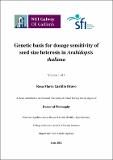| dc.contributor.advisor | Spillane, Charles | |
| dc.contributor.author | Castillo Bravo, Rosa María | |
| dc.date.accessioned | 2021-09-08T14:17:31Z | |
| dc.date.issued | 2021-09-08 | |
| dc.identifier.uri | http://hdl.handle.net/10379/16923 | |
| dc.description.abstract | Heterosis refers to the ability of the F1 offspring to display superior characteristics compared with their parents and despite being genetically studied since the early 1900s, many aspects of this phenomenon remain unclear. Heterotic effects on seed size, an important agronomic trait, can be elicited by diverse mechanisms such as hybridity and/or genome dosage effects (e.g. polyploidy or the presence of more than two full chromosome sets within a cell). The angiosperm seeds are complex structures comprising the two fertilisation products (i.e. embryo and endosperm), enclosed by a sporophytic maternal tissue (the seed coat), which differ in their genetic composition and ploidy level. The endosperm is characterised by a misbalance of genome dosage (2m:1p maternal:paternal genome ratio) and nourishes the embryo with nutrients acquired from the mother plant. However, endosperm development can be affected when parental genome dosage perturbations occur (e.g. mating between individuals of different ploidy levels), leading to dramatic seed size changes according to whether maternal or paternal genomes are in excess.
In this thesis, I studied parent-of-origin effects (which typically occur when the phenotype depends on whether it is inherited maternally or paternally) on seed size associated with both hybridity and genome dosage. Using natural variation of Arabidopsis thaliana accessions, I investigated the unique genetic and phenotypic effects only observed when maternal to paternal genome dosage ratios are altered in the F1 developing seed, and demonstrated that a MYB-type transcription factor (MYB119) is a genome-dosage specific regulator of triploid F1 seed size when the maternal genome dosage is in excess. Finally, I further showed that the effects of MYB119 on F1 seed size are dependent upon its own gene dosage (maternal and paternal), independently of other genomic regions. This thesis highlights the importance of maintaining the stoichiometric genome dosage balance for ensuring parental control over resource allocation to F1 seeds. Taken together, our results could open new avenues in developing new genome dosage-based strategies for trait improvement in plant breeding programs, as polyploidy is very common among some of the most valuable crops, including bread wheat, potato or upland cotton. | en_IE |
| dc.publisher | NUI Galway | |
| dc.rights | Attribution-NonCommercial-NoDerivs 3.0 Ireland | |
| dc.rights | CC BY-NC-ND 3.0 IE | |
| dc.rights.uri | https://creativecommons.org/licenses/by-nc-nd/3.0/ie/ | |
| dc.subject | hybridity, heterosis, seed size, genome dosage, triploidy, Arabidopsis thaliana | en_IE |
| dc.subject | hybridity | en_IE |
| dc.subject | heterosis | en_IE |
| dc.subject | seed size | en_IE |
| dc.subject | genome dosage | en_IE |
| dc.subject | riploidy | en_IE |
| dc.subject | Arabidopsis thaliana | en_IE |
| dc.subject | Natural Science | en_IE |
| dc.subject | Science and Engineering | en_IE |
| dc.subject | Plant and AgriBiosciences | en_IE |
| dc.subject | Science | en_IE |
| dc.title | Genetic basis for dosage sensitivity of seed size heterosis in Arabidopsis thaliana | en_IE |
| dc.type | Thesis | en |
| dc.contributor.funder | Science Foundation Ireland | en_IE |
| dc.local.note | Heterosis refers to the ability of the first filial generation to display superior characteristics compared with their parents and despite being genetically studied since the early 1900s, many aspects of this phenomenon remain unclear. Heterotic effects on seed size, an important agronomic trait, can be elicited by diverse mechanisms such as genetic hybridity and/or genome dosage effects (e.g. polyploidy or the presence of more than two full chromosome sets within a cell). This thesis explores the unique effects that result from the combination of altered genome dosage and hybridity on the developing offspring, opening new avenues in plant breeding programs using genome dosage-based strategies for trait improvement. | en_IE |
| dc.description.embargo | 2025-09-07 | |
| dc.local.final | Yes | en_IE |
| dcterms.project | info:eu-repo/grantAgreement/SFI/SFI Investigator Programme/13/IA/1820/IE/Harnessing epigenetic and genome dosage effects on hybrid vigour for sustainable crop and food production/ | en_IE |
| nui.item.downloads | 0 | |


